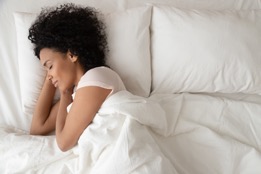We spend about a third of our lives sleeping, which is hard to believe on the nights we’re tossing and turning until 4 a.m.! We all know how important sleep is to maintaining overall health and wellbeing, so why is it so hard to do sometimes?
To help you catch better zzz’s, here’s a closer look at the science behind sleep, inspired by a recent article in mindbodygreen.com.
It’s all about rhythm.
Circadian rhythm, bio-rhythm…there are many different ways to describe the natural ebb and flow of your body’s sleep-wake cycle. The body has various rhythms which tend to cycle in 3’s. Examples of this include our sinuses, which cycle in 90-minute increments (we see this when we have a cold and our nose is stuffed up on one side, and then, in about 90 minutes, it closes down and the other side stuffs up). This cycle also applies to sleep; if we feel sleepy and don’t go to bed, it’s usually about 90 minutes before we can easily lay down and go to sleep. This system is influenced by the pituitary, catecholamines, and neurotransmitters, all of which impact melatonin, the sleep-regulating hormone. Melatonin, a hormone produced in the brain, is affected by the presence or absence of light through the eyes. During the day, when you’re alert and wide awake, your melatonin levels go way down, while at night, around 9 p.m., your melatonin levels start to rise naturally, helping you feel sleepy and ready to put your head down. When your sleep-wake cycle is in balance, your melatonin levels are rising and falling at appropriate times, helping you to fall asleep and stay asleep for a restorative snooze.
However, we all know that our sleep cycle isn’t always so perfect. The natural flow of melatonin production can be altered by things that change the catecholamines, like stressors, which explains why the question, “How’d you sleep?” is such a hot topic every morning. The fact is, we don’t always sleep well. So, how can you get better sleep? Here are some basic guidelines:
Everything they say about preparing for an optimal sleep environment is true!
Your goal is to increase your body’s melatonin levels, so how do you do that? Lowering the lights and turning off media with bright colors, i.e., computers, tablets, TV’s, and games. Other key behaviors include turning the temperature to cool, taking a brisk 10-15 minute walk, and quieting your environment with soft music or silence.
Melatonin supplements can help.
Life happens. Whether your sleep cycle is out of balance from an all-nighter before exams or working the night shift, melatonin supplements may help. Clinical research on jet lag indicates that daily doses of melatonin (between .5 to 5 mg) are helpful for sleep, and that 5 mg may help you fall asleep faster and longer.
When it’s about more than just melatonin.
Sometimes, your quality of sleep is a sign of an undetected health concern, such as a hormonal imbalance. Dr. Robert Messer, Chief Science Officer at BESANA Health & Wellness, is passionate about helping you live your fullest life, and he will work with you to uncover the root causes for your sleep issues so you can feel restored to your optimal balance and vitality. Dr. Messer and his team can help you achieve better sleep with a combination of tools, including lifestyle adjustments, supplements, and other testing, if indicated.
To learn more about wellness tools at BESANA, please call 303.327.7300 or request a consultation online.
